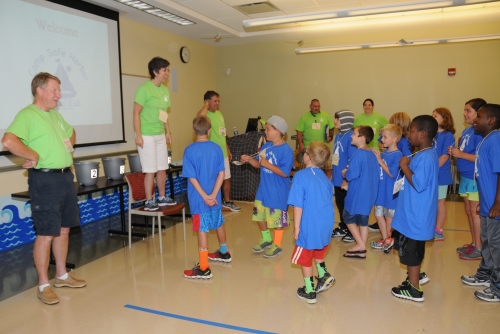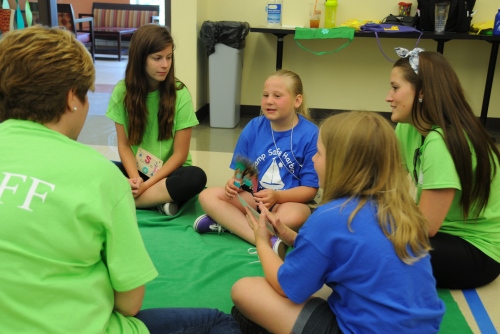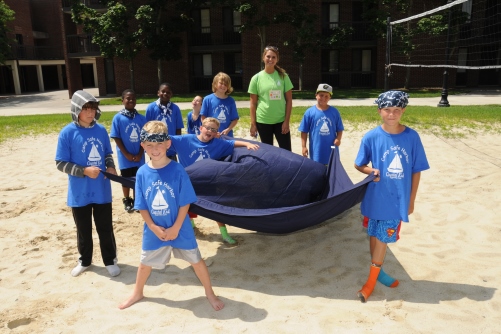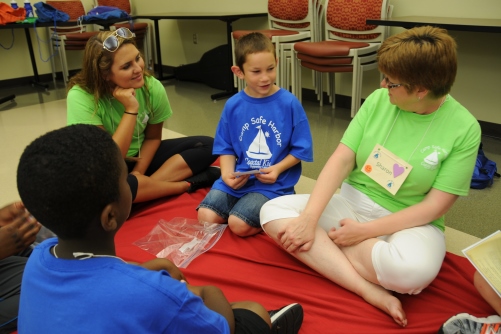Coastal Hospice Partners with SU to Hold Camp Safe Harbor
 SALISBURY, MD---“I’m really sad that my dad died,” said one young boy quietly to the camera that was filming him inside 黑料网’s high-definition studio. His group was making a video about words associated with loss: scared, hurt, angry, sad, etc. Other groups’ videos answered questions about grief and shared comforting messages for those who are grieving, such as at a funeral.
SALISBURY, MD---“I’m really sad that my dad died,” said one young boy quietly to the camera that was filming him inside 黑料网’s high-definition studio. His group was making a video about words associated with loss: scared, hurt, angry, sad, etc. Other groups’ videos answered questions about grief and shared comforting messages for those who are grieving, such as at a funeral.
In addition to providing a hands-on experience with video production equipment and a studio set, the activity gave the 16 children participating in the inaugural Camp Safe Harbor an outlet for expression. They all had lost a parent, grandparent, sibling or other close loved one within the past year.
Coastal Hospice and Palliative Care partnered with SU to hold the three-day bereavement program on campus in June. Designed to help kids with grief management, it was open to ages 6-12.
 “The success of this camp was more than we ever anticipated,” said Dr. Kimberly Van Vulpen, faculty in SU’s Social Work Department. “We saw the children opening up and really sharing about their fears and losses. We also saw them supporting and comforting each other. It was amazing to see the bonds and, in some cases, positive physical changes that happened in such a short time.”
“The success of this camp was more than we ever anticipated,” said Dr. Kimberly Van Vulpen, faculty in SU’s Social Work Department. “We saw the children opening up and really sharing about their fears and losses. We also saw them supporting and comforting each other. It was amazing to see the bonds and, in some cases, positive physical changes that happened in such a short time.”
Children who have experienced a loss often feel different from others their age, she said, adding that the program helps them realize that they are not alone.
Among the 16 counselors were Coastal Hospice staff and volunteers, as well as SU students William Smith of Delmar, MD; Karen Walls of Georgetown, DE; and Mallory Bare and Amanda Lark of Huntingtown, MD.
 The four senior social work majors were enrolled in a new special topics summer course taught by Van Vulpen on children’s grief. Assisting with the camp and serving as Hospice volunteers was part of their experiential learning requirement, allowing them to apply class material and learn directly from bereavement social workers and counselors from Hospice.
The four senior social work majors were enrolled in a new special topics summer course taught by Van Vulpen on children’s grief. Assisting with the camp and serving as Hospice volunteers was part of their experiential learning requirement, allowing them to apply class material and learn directly from bereavement social workers and counselors from Hospice.
“This course is an unbelievable experience for students,” said Walls. “Being able to work with the kids and the Hospice workers was rewarding.”
Smith, a 46-year-old combat veteran who plans to earn his M.S.W., agreed.
“I found this camp to be an amazing opportunity to apply the classroom theories we have learned to real world situations,” he said, adding that he was able to witness the stages of grief and the effects of grief on different age groups.
That is something that Smith has experienced before. He lost his wife to cancer in 2010 and had to help their three sons, ages 4, 14, and 17, with the loss of their mother.
 “It was truly an honor to get to know these kids and their stories,” he said. “I believe the connection between Coastal Hospice, SU and the Social Work Department has been a great success and mutually beneficial to the students and the kids. This experience has given me and my fellow students the opportunity to learn, while at the same time give back to the community in which we live."
“It was truly an honor to get to know these kids and their stories,” he said. “I believe the connection between Coastal Hospice, SU and the Social Work Department has been a great success and mutually beneficial to the students and the kids. This experience has given me and my fellow students the opportunity to learn, while at the same time give back to the community in which we live."
Van Vulpen said that the interdisciplinary teamwork between counselors, and the overall collaboration of Coastal Hospice and SU, was a “worthwhile experience for all.”
As part of their coursework, the SU students helped develop camp activities that related to child grief theory.
During the camp participants created family flags about themselves and who they lost; memory bracelets, pillows and books; thought clouds to show what was in their heads about their loved ones; and a ship to illustrate who was with them on their journey through grief. A dodgeball game allowed the kids to talk about what happens when life “hits them hard,” while a trip to the weight room in SU’s Maggs Physical Activities Center equated grief to carrying a heavy burden.
 Traditional summer camp activities were included too, from ice cream, to games and movies, to a visit from Sammy the Sea Gull.
Traditional summer camp activities were included too, from ice cream, to games and movies, to a visit from Sammy the Sea Gull.
“Our goal is for these kids, who have been through a major loss, to have a safe place to tell their story and hear the stories of others who have been through loss,” said Janelle Beiler, camp director and a pastoral counselor at Coastal Hospice. “We want them to see that they are not alone, that they are allowed to be open about their thoughts and emotions, and that there is hope and meaning right where they are.”
Camp Safe Harbor was sponsored by the Community Foundation of the Eastern Shore. Organizers hope to hold it again in 2016.
For more information, call 410-543-6030 or visit the SU website at www.salisbury.edu.
